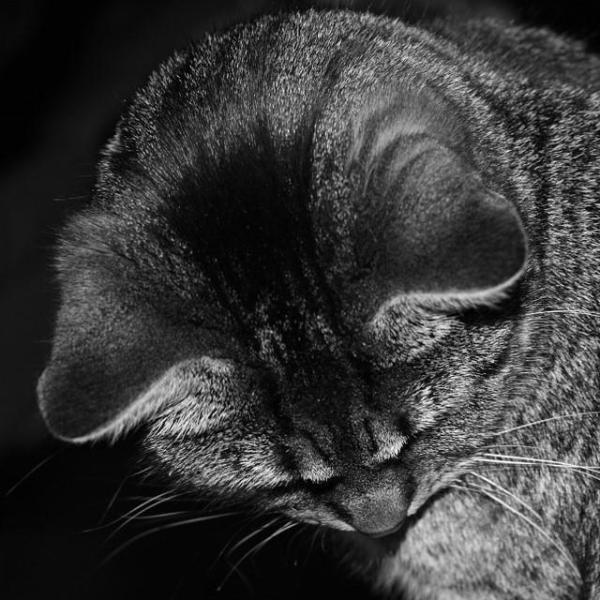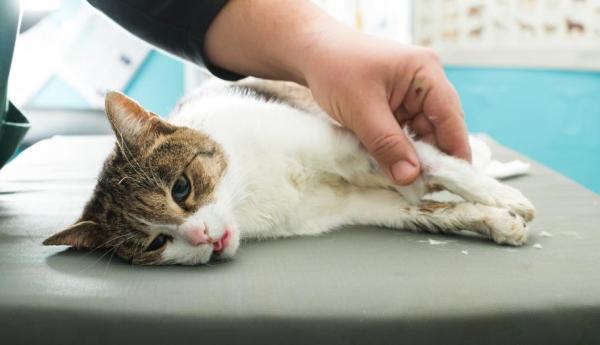
Occasional vomiting is a common problem in cats and it is not necessarily serious. However, if your cat vomits more frequently, this could be a symptom of a more serious condition and you should take your cat to a vet immediately to find out the cause.
Vomiting is a reflex that causes the active removal of the digestive content through the mouth, especially food from the stomach. It is important not to confuse vomiting with regurgitation, which is a passive rejection, without the active contraction of the abdomen and which expels undigested food or saliva.
This AnimalWised article will explain what to do if your cat vomits.
Emergency cases
If your cat is vomiting and their level of consciousness is altered, watch and monitor your pet to ensure that no digestive substance passes through the airways. After they have expelled the digestive contents, move your pet away from this and clean their mouth and around their nose to make sure that they are not blocked, being careful not to get bitten or scrammed.
If the cat is an adult and in good health, with no other symptoms and is not dehydrated, you can reduce their food substantially or completely for 12 to 24 hours, giving them water in small amounts. But beware, in certain circumstances, a prolonged fast is bad, especially in cats suffering from obesity. Discover how to create a soft diet for cats with the help of AnimalWised.
Monitor your cat carefully for 24 to 48 hours following the vomiting episode. If they vomit again or if their general condition deteriorates, take your cat to an emergency veterinarian.

Act according to the cause
Examine the expelled vomit to determine the severity of your cat's condition and to help your vet get to the root of the problem. The expelled content can be any of the following: undigested food, gastric fluid, bile fluid (yellowish or greenish), blood (bright red or brown if digested blood), foreign bodies, plants or hairballs.
Hairballs
One of the most common causes is the formation of trichobezoars, more commonly known as hairballs. As your cat grooms them-self, they ingest a lot of hair which then forms a ball in their digestive system and is generally expelled through vomiting. To avoid this type of vomiting, you can groom your cat. This is particularly important for long-haired breeds, which should be brushed on a daily basis to avoid matting of the fur.
Your cat ate too quickly
Your cat may have vomited simply because they have eaten too much food too quickly. As a result, their stomach has not had time to digest the food and therefore needs to expel it. If the food has only reached the oesophagus and not the stomach, this is known as regurgitation. If your cat eats too fast, you need to ration their food and give them small portions but more often, making sure they eat calmly and chew properly.
Stress
Another cause of vomiting in cats is stress. Cats are very sensitive to change, be it a change of environment or a dietary change; these can put them in a state of mild or severe stress. If you've moved house, you've recently done work in your house, you've changed their food or another pet has been introduced into the home, your cat may well be stressed and this is most likely the cause of the vomiting. To help your cat, make sure they have a safe and quiet space in which they can relax and seek solace. When it comes to food, cats prefer to eat 15 to 20 small servings per day. So, leave their daily amount of food freely available so that they can pick at it throughout the day. If you cannot help your stressed cat, you could consult a vet specialising in behaviour who can give you advice on the use of pheromones or other medications for your cat.
Food intolerance
If your cat is vomiting frequently with or without diarrhoea, without appetite loss or other symptoms, the cause may be an alimentary intolerance or acute or chronic gastritis. If you think that's the case, you can make your cat fast for 24 hours. If they continue to vomit, you should take your cat to a vet for a diagnosis and appropriate treatment. If you're going to put your cat on a fast for 24 hours, observe them carefully because a prolonged fast like this can cause changes in harmful intestinal flora. Be prudent and always call your vet before making any changes of this kind.
Poisoning
Another cause may be poisoning. Think about whether your cat has ingested any abnormal substance. If you suspect that your cat has eaten a toxic substance, call your vet immediately. He/she will be able to advise you accordingly, depending on the type of toxins that your cat has ingested.
Another more serious condition
If vomiting episodes are accompanied by other symptoms such as loss of appetite, fever, bloody diarrhoea, constipation, it is most likely caused by a more serious condition, such as parasites, diabetes, leukaemia or cancer. List all of the symptoms to help your veterinarian determine the diagnosis.
It is always useful to take your cat?s temperature, which should not exceed 39 degrees. Monitor you cat closely for neurological disorders such as dizziness, seizures and altered consciousness. An increased thirst, recent oestrus or urinary disorders are important symptoms to take into account when diagnosing the cause of vomiting.

This article is purely informative. AnimalWised does not have the authority to prescribe any veterinary treatment or create a diagnosis. We invite you to take your pet to the veterinarian if they are suffering from any condition or pain.
If you want to read similar articles to What to Do if Your Cat Vomits, we recommend you visit our Intestinal problems category.